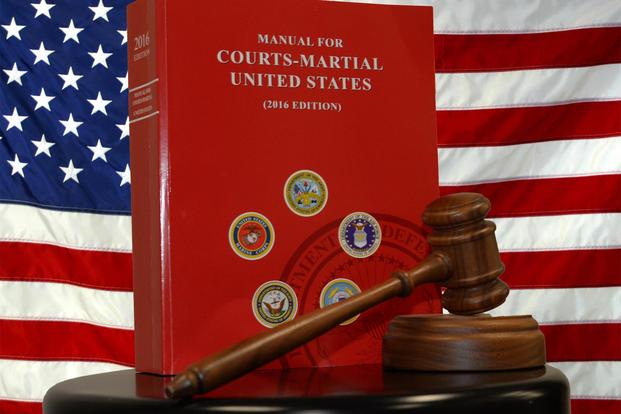What Is a Dishonorable Discharge?
A dishonorable discharge is a type of military separation given as a punishment for a felony-level offense during service, whether in the military or civilian jurisdiction. In the military, it is handed down by a court-martial.
In the armed forces, there are two types of punitive discharges: a Bad Conduct Discharge (BCD) and a dishonorable discharge.
A dishonorable discharge is considered the most severe of the military discharge types. If you receive this form of military discharge, the U.S. government does not legally consider you a veteran, and therefore you generally cannot receive most veterans benefits. This includes federal benefits and many on the state level as well.
For those who are dishonorably discharged, it could also limit their post-military career opportunities and could disqualify them from civilian government benefits such as unemployment and federal student loans.
"It's an indelible mark of their service that follows them for the rest of their lives into the workforce, through background checks, social relationships, and it precludes them from getting the kind of support most veterans enjoy," Phil Carter, an Iraq War vet and senior fellow at the Center for a New American Security, told the Associated Press in 2015.
Technically, officers cannot receive a dishonorable discharge. If an officer is convicted in a court-martial, he or she may be dismissed from the service, or resign for the good of the military, which is effectively the same as a dishonorable discharge.
Related: State Veterans Benefits
Reasons for a Dishonorable Discharge
A dishonorable discharge is given to service members convicted of offenses that would be considered felonies in the civilian world, or of military offenses that warrant severe punishment.
The Uniform Code of Military Justice (UCMJ) is a special set of laws made just for members of the military, besides having to obey the laws of the United States and host countries in times of peace under international treaties.
The UCMJ applies to all active-duty members as well as activated National Guard and Reserve members and military academy students.
Read More: The Uniform Code of Military Justice (UCMJ)
About "1% of veterans receive punitive discharges, characterized as 'Bad Conduct' or 'Dishonorable' for enlisted service members, or 'Dismissals' for officers," according to a 2017 study, "The Association between Discharge Status, Mental Health, and Substance Misuse among Young Adult Veterans."
Of the punitive discharge types, being discharged from the military with "dishonorable" status is much more rare, accounting for about 0.1% of discharges, according to the Veterans Legal Clinic.
Conduct that Warrants a Dishonorable Discharge
There are many reasons for dishonorable discharge. Dishonorable discharges are handed down for what the military considers the most reprehensible conduct. These offenses include:
- Murder/Manslaughter
- Fraud
- Desertion
- Treason
- Espionage
- Sexual assault
- Being Absent Without Leave (AWOL)
The Consequences of a Dishonorable Discharge
The VA generally will not provide benefits to a former military member who received a dishonorable discharge. These benefits can include health care, disability compensation, homelessness assistance and more.
- Medical benefits: Veterans with a dishonorable discharge are not eligible for VA health care.
- Disability compensation: Veterans with a dishonorable discharge are not eligible for VA disability compensation.
- Educational benefits: The Post-9/11 GI Bill and Montgomery GI Bill require an honorable or general discharge; all other education benefits (Survivors' and Dependents' Educational Assistance, or DEA, and Veteran Readiness and Employment, or VR&E) require an "other than dishonorable" discharge.
- VA home loan: Veterans with a dishonorable discharge are not eligible for VA home loans.
- Certain civilian rights, such as the right to bear arms. Under federal law, those receiving a dishonorable discharge from the military lose their right to possess firearms.
- Federal employment: For most people, their type of military discharge has very little effect on later job searches. But some employers, usually in the fields of law enforcement, government or defense, pay close attention to your type of discharge. However, some states have laws that prevent employers from asking about an applicant's type of military discharge.
- Civilian government benefits: With a dishonorable discharge, you may be denied unemployment benefits, federal student loans, etc.
- Moving benefits: Typically, when they leave service, military members are authorized a final move at government expense. That includes shipment of their household goods, meals and lodging necessary to complete the travel, plus the cost of travel for them and any dependents. With a dishonorable discharge, you may simply receive a one-way ticket home on the cheapest form of transportation available.
- Homelessness assistance: Many state-level health and housing benefits support homeless veterans. However, these may be denied to those with dishonorable discharges.
- May not be eligible to receive DoD or VA funeral and burial benefits.
Can You Appeal a Dishonorable Discharge?
Veterans who appeal a less-than-honorable discharge often are successful in having it upgraded.
Veterans who left the military after Dec. 20, 2019, with a discharge that's less than honorable can appeal that discharge characterization via the Discharge Appeal Review Board.
Service members being separated with an "other than honorable" discharge must be informed in writing that they may ask the VA to review their service record to determine eligibility for veterans benefits.
Military Discharge Upgrade
The VA will review the member's service record to determine the specific cause for the discharge. Some crimes, like desertion or spying, are permanent bars to benefits.
When a veteran with a less-than-honorable discharge applies for benefits, the VA will examine the service information and make a character of discharge determination. If the VA makes a positive determination, the veteran becomes eligible for benefits. If there is a negative determination, the veteran may request to have their discharge changed by the military.
Each branch has a discharge review board with authority to change, correct or modify discharges. The board has no authority to address medical discharges or those issued by a general court-martial.
Related: How to Upgrade Your Military Discharge
Although DD Form 149, the Application for Correction of Military Record, is the document you'd submit to try to change your military service record. To appeal your discharge status, the paperwork you'll want is DD Form 293, Application for the Review of Discharge from the Armed Forces of the United States.
Know All Your Legal Rights and Benefits
Be aware and get what you are entitled to. Keep up with all the legal benefits available to you as a service member, veteran or spouse and get updates delivered straight to your inbox by subscribing to Military.com.












